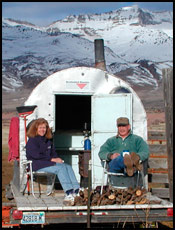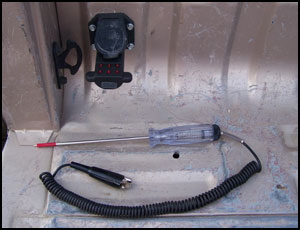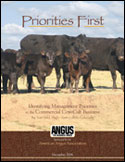
Ron Torell with his wife, Jackie.
Cow Camp Chatter
Trailer lights
If you own an older-model ranch trailer and/or truck, chances are you share in the frustration of maintaining functional lights and brakes. You can park your trailer with the lights fully operational only to return to find they no longer work. These same lights may be working when you hook them up and drive off, but 5 miles down the road they are out again. It's enough to make you want to jump out of a basement window.
In this edition of "Cow Camp Chatter," I offer you tips from several experts I recently interviewed on the subject.
Start with the obvious
Bill Furry, shade-tree ranch mechanic of Clover Valley, Nev., has years of experience repairing and rewiring old worn-out light systems and offers this sound advice based on his experience.
"It is always prudent to check the obvious first, which is the towing vehicle itself and the fuse box," Furry advises. "Most trucks manufactured after 1999 have a separate fuse for the trailer turn and brake signals. The lights can work on the vehicle, yet the fuse for the trailer turn and brake lights could be blown. Check the owner's manual for the truck to locate this fuse, and always carry extra fuses with you.

A trailer emulator and test light are handy and valuable tools for isolating electrical problems.
"If the fuse is good, then I suggest you move to the plug connections," he recommends. "You can easily check these connections with a test light or trailer emulator (see photo). Both are inexpensive tools and vital to trouble-shooting both the truck and trailer."
Perry Hought, owner/manager of Riverside RV in Elko, Nev., along with his mechanic, Kevin Heimbough, agree with Furry. They advise prevention over repair.
"Most newer-model vehicles and stock trailers are wired with a seven-way plug, which is far superior to the older-model five- and six-way plugs," Hought states. "Utilizing a better-quality seven-way plug when rewiring a truck and trailer will reduce future problems."
Heimbough recommends soldering all wiring connections rather than using the cheap fixes such as the close clamp connectors.
"These close clamp connections are a quick fix that eventually corrode and cause the system to fail," he says. "If you are having problems with intermittent lights, take a small screwdriver and spread the copper connectors on the male plug side. This forms a better connection to the trailer female side. You may even need to take a pocket knife and scrape the copper connector on both the male and female [because] oxidation and corrosion over time weaken this connection."
Wire insulation
According to Gig Thornburg, owner/manager of Gateway RV in Elko, Nev., the wiring insulation on these older trailers deteriorates to the point that the inner copper wire is allowed to come in contact with the metal trailer, thus grounding out the system.
"Locating that short is often the challenge," Thornburg says. "Start your search at contact points where the wiring enters a pipe or corner of the trailer. If the wiring is deteriorated to the point that the reoccurring problems persist, you may have to completely rewire the trailer. Going to the extra expense of wiring between junctions with the commercial bundled and double outside insulated wire as well as utilizing junction boxes is my advice. This is a preventative measure that pays off in the long run."
Stay grounded
All four experts suggest that a good ground is necessary for any electrical system to function properly. They advise you to double-check your ground wire and, if necessary, run a separate ground wire from the trailer to the truck. Another approach is to utilize plug covers when not in use on both the truck and trailer. These covers will limit exposure to moisture and corrosion in the plugs themselves.
As a preventative measure, silicone the area where the wiring contacts sharp corners to metal. This inexpensive effort will reduce the chance of future shorts in the wiring.
If you are completely rewiring a trailer, the experts recommend that you run new wiring in an accessible moisture-free area, such as overhead in the trailer. Placing the wire in pipe or conduit is preferred because it limits contact to sun, metal and moisture, as well as access to mice and livestock who often chew or damage wiring insulation. Keep in mind that welding in close proximity to the conduit carrying this wiring may melt wiring insulation. These shorts inside of conduit are very difficult to identify and repair.
In addition to being a legal issue that could fetch you a hefty citation, maintaining functional lighting and braking systems is a safety issue. This includes not only the safety of the driver of the vehicle but that of other motorists and cargo as well. Many of us have hauled heavy loads of livestock with a failing brake system and experienced the difficulty in stopping. It is for all these reasons we need to maintain a functional electrical system on our vehicles and trailers.
 When you stop to think about it, there is little wonder why we have such a problem maintaining functional lights and brakes on our ranch vehicles and trailers. The conditions under which we operate are not conducive to longevity. Perhaps by following the advice offered by these experts, our frustration with this never-ending problem will be reduced.
When you stop to think about it, there is little wonder why we have such a problem maintaining functional lights and brakes on our ranch vehicles and trailers. The conditions under which we operate are not conducive to longevity. Perhaps by following the advice offered by these experts, our frustration with this never-ending problem will be reduced.
That's enough for this month. As always, if you would like to discuss this article or simply want to talk cows, do not hesitate to contact me at 775-385-7665 or send me an e-mail.
[Click here to go to the top of the page.]




